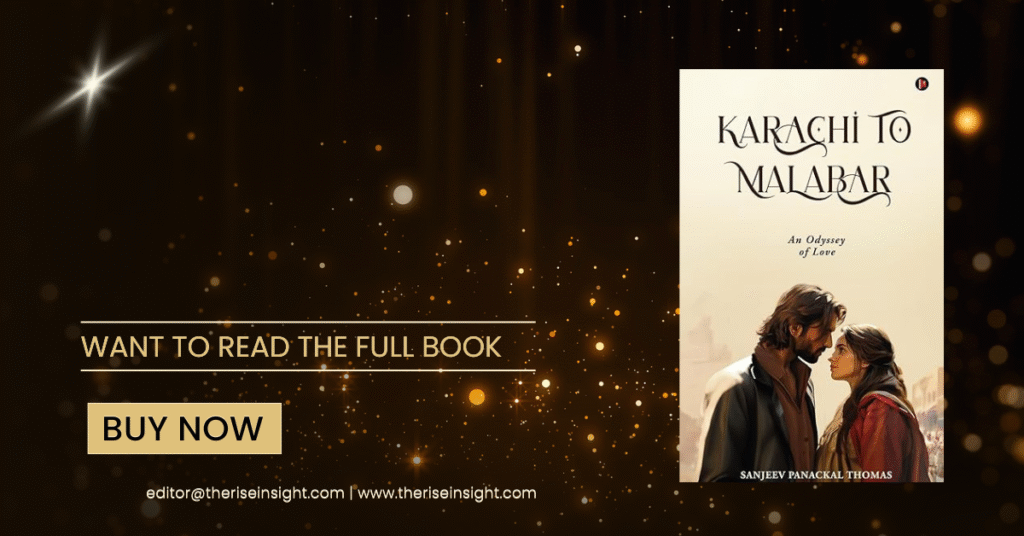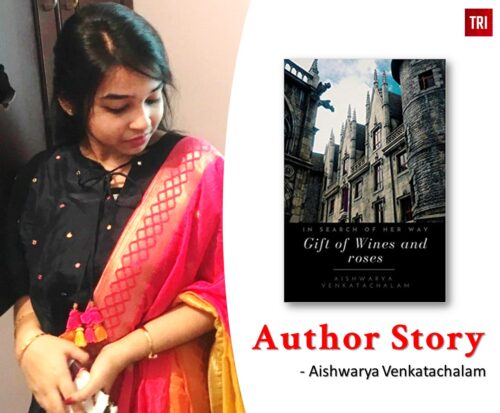
Table of Contents
Toggle🥇 Heartfelt Congratulations
The Rise Insight and the entire TRI Literary Awards jury extend heartfelt congratulations to Sanjeev Panackal Thomas on his remarkable win at the TRI Literary Awards 2025 (Season 03). Karachi to Malabar: An Odyssey of Love stood out not only for its literary finesse but for the emotional truth it so poignantly conveys. This honor recognizes not just a book—but a lived experience transformed into art, a tribute to love, loss, and the deeply human need to make sense of it all.
📘 About the Book: Karachi to Malabar
KTM: An Odyssey of Love is an evocative tale that follows Zohal, a Pashtun girl, on her sweeping journey across borders, cultures, and generations in search of her lover—and the father of her child. But this is no ordinary love story. It is an emotional excavation, stitched together with the threads of longing, identity, pain, and resilience. What begins as a woman’s quest for connection evolves into a rich tapestry of self-discovery—an exploration of what it means to belong, to lose, to heal, and to love again.
Inspired by the author’s personal grief after losing both parents within a year, the novel channels an intimate anguish into a universal narrative. At the heart of this journey is the crumbling illusion of family bonds, and the painful realization that sometimes, blood is not thicker than water. Through Zohal’s eyes, we witness not just the weight of separation and displacement, but also the fragile, persistent pulse of hope.
👨🎨 About the Author: Sanjeev Panackal Thomas
Sanjeev Panackal Thomas is a multifaceted individual whose life straddles the worlds of corporate leadership, entrepreneurship, visual art, and literature. A former President at Binani Industries, recipient of a national CSR award from Dr. A.P.J. Abdul Kalam, and now founder of companies across India and Dubai, his professional achievements are noteworthy. But beneath the executive persona lies a deeply introspective artist and writer.
A graduate of The Lawrence School, Lovedale, and an alumnus of Cochin University, Sanjeev combines the rigor of a structured life with the fluidity of creative expression. Karachi to Malabar marks his debut as a novelist, but its emotional gravity and literary craftsmanship speak of someone who has long carried this story in his soul. His art and writing are both meditative, slow-burning, and textured—mirroring the inner journey he invites his readers into.

📚 A Deep-Dive Review of Karachi to Malabar: An Odyssey of Love
(By The Rise Insight Review Panel)
To say that Karachi to Malabar is a novel about love would be both accurate and insufficient. Yes, it is a love story—but not in the commercial, saccharine sense. It is a story of raw, elemental love: the kind that survives across continents and timelines, but also the kind that shatters you into pieces before it makes you whole again.
The book opens with Zohal’s quest—a young woman whose identity is woven with the heritage of mountains and the resilience of nomadic blood. Her journey begins in the dusty valleys of Pashtun terrain, but it quickly transcends geography to become a metaphysical pilgrimage. She is searching not only for the man who left her pregnant and longing, but for a sense of closure, of selfhood, of belonging.
Sanjeev’s prose is unhurried yet gripping. There is a deliberate elegance in his language, akin to classical literature, yet rooted in modern emotional complexity. Each sentence feels carefully placed, like strokes on a canvas—reflective of his background as a painter. The story is narrated with empathy and introspection, and it often meanders into philosophical musings, which serve to elevate the narrative from plot-driven fiction into soul-searching literature.
The most compelling aspect of the novel is how personal grief becomes creative ignition. The sections where the narrator reflects on the death of his parents are not separate from Zohal’s story—they are parallel strands. The loss of family, the disintegration of sibling bonds, and the questioning of what “home” and “blood” mean—these are recurring motifs. The author’s decision to interlace personal pain into Zohal’s fictional arc adds authenticity and emotional depth. You don’t just read about Zohal’s suffering—you feel it pulse with the author’s own heartbreak.
And then there is the unmissable influence of Anjolie Ela Menon, the legendary Indian artist whose paintings inspired many of the emotional textures of this book. Though her artwork could not be used due to copyright restrictions, their spiritual presence lingers in the characters—particularly in Zohal’s evolution. She is not painted as a tragic figure, but as a woman forged in fire—burning, but unbroken.
The novel is global in setting but intimate in tone. From the bustling streets of Karachi to the serene coastline of Malabar, the novel captures the beauty and violence of displacement. It comments quietly but powerfully on gender, trauma, intergenerational silence, and the mythology of family. The recurring question throughout the book—what really binds us to each other?—is answered in many ways, sometimes through tenderness, other times through severance.
In terms of structure, the novel is not bound by linearity. It flows like memory itself—nonlinear, fragmented, looping, and occasionally surreal. This can challenge readers expecting a straightforward plot, but it richly rewards those willing to surrender to its rhythm. Like a raga that takes time to unfold, Karachi to Malabar is more about resonance than resolution.
Another remarkable strength is its portrayal of emotional contradictions—the way love and resentment coexist within families, the way longing and freedom war within the soul. Sanjeev does not offer easy answers. Instead, he invites readers to sit with discomfort, to see themselves in broken mirrors, and perhaps to gather the courage to piece themselves back together.
Here is personalized feedback from each of the nine reviewers after reading Karachi to Malabar: An Odyssey of Love by Sanjeev Panackal Thomas:
Prashant Sahu:
Karachi to Malabar deeply moved me with its honest portrayal of human emotion. Zohal’s journey felt raw and authentic, and the writing carried a haunting lyrical quality that stayed with me. The book doesn’t just narrate a story—it bares a soul.
Sameer Gudhate:
What struck me most was the depth of introspection. Sanjeev’s prose is rich with philosophical undertones, and the non-linear structure mirrors the way memory works. It’s a bold debut that reflects personal loss with artistic grace.
Apeksha Gupta:
I was captivated by the female protagonist’s strength. Zohal is not portrayed as a victim, but as a survivor—resilient, complex, and beautifully human. The emotional evolution of her character felt real and empowering.
Akansha Sinha:
This novel resonated with me on a very personal level. The theme of fractured families and the illusion of blood ties was painfully relatable. The metaphor of pearls and the broken string was poetic and unforgettable.
Glenville Asbhy:
Sanjeev’s book is a literary meditation on love, identity, and belonging. I appreciated the cultural fluidity and how effortlessly the narrative crossed borders—geographically and emotionally. A brilliant blend of fiction and memoir.
Pooja Sahu:
Reading Karachi to Malabar felt like peeling back layers of memory and emotion. The writing is immersive and cinematic, and every character seems to carry a secret, making the reading experience deeply engaging.
Versha Singh:
The novel explores silence as powerfully as it does speech. What’s unsaid often hits harder than what’s written, and that’s where the book excels. It’s subtle, sophisticated, and stunningly profound.
Shivangi Yadav:
This book took me on a journey I didn’t expect to travel—one filled with grief, beauty, and resilience. The painter’s influence in the writing is visible; each scene feels like a canvas, emotionally colored and intentionally crafted.
Kavita Kaushik:
Karachi to Malabar is not just a novel—it’s an emotional experience. Sanjeev’s ability to transform his own pain into something universally resonant is commendable. It’s a book that made me pause, reflect, and feel deeply.
🖋️ Final Thoughts
Karachi to Malabar: An Odyssey of Love is not just a book—it is an emotional offering, a meditation on human connection, and a personal exorcism. Sanjeev Panackal Thomas has given us a literary work that refuses to be categorized. It is fiction, yes. But it is also memoir, philosophy, and elegy.
It is a triumph not only of storytelling but of soul-bearing. The narrative lingers with you long after the last page, like the aftertaste of a truth you always knew but never had the words to express.
This is a debut that feels like the work of a seasoned literary artist—because in many ways, it is. The story may be new to the world, but it has lived within its author for decades, and now it lives in us.
Congratulations once again to Sanjeev Panackal Thomas for this extraordinary contribution to Indian literature.
May this award be the first of many, and may your pen continue to be your voice, your solace, and your legacy.




